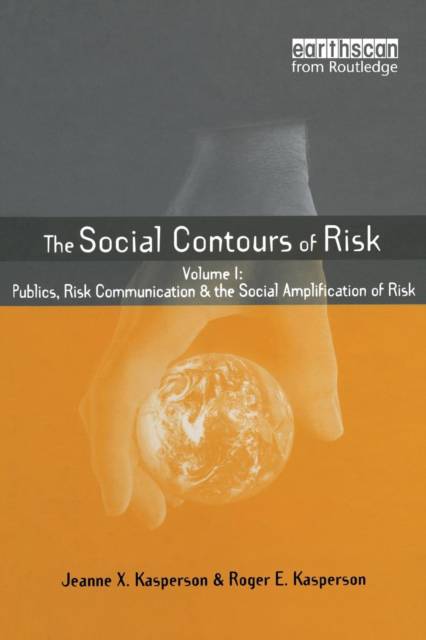
- Retrait gratuit dans votre magasin Club
- 7.000.000 titres dans notre catalogue
- Payer en toute sécurité
- Toujours un magasin près de chez vous
- Retrait gratuit dans votre magasin Club
- 7.000.0000 titres dans notre catalogue
- Payer en toute sécurité
- Toujours un magasin près de chez vous
Social Contours of Risk
Volume I: Publics, Risk Communication and the Social
Roger E Kasperson, Jeanne KaspersonDescription
We live in a 'risk society' where the identification, distribution and management of risks, from new technology, environmental factors or other sources are crucial to our individual and social existence. In The Social Contours of Risk, Volumes I and II, two of the world's leading and most influential analysts of the social dimensions of risk bring together their most important contributions to this fundamental and wide-ranging field.
Volume I collects their fundamental work on how risks are communicated among different publics and stakeholders, including local communities, corporations and the larger society. It analyses the problems of lack of transparency and trust, and explores how even minor effects can be amplified and distorted through media and social responses, preventing effective management. The final section investigates the difficult ethical issues raised by the unequal distribution of risk depending on factors such as wealth, location and genetic inheritance - with examples from worker and public protection, facility-siting conflicts, transporting hazardous waste and widespread impacts such as climate change.
Volume II centres on the analysis and management of risk in society, in international business and multinationals, and globally. The 'acceptability' of risk to an individual depends on the context, whether the larger society or in, for example, a corporate framework. Their work clarifies the structures and processes for managing risks in the private sector and the factors that produce or impede effective decisions. The authors demonstrate that corporate culture is crucial in determining risk management. They analyse the transfer of corporate risk management systems from industrial to developing countries, and how globalization is spreading and creating new kinds of risk - the combination of traditional and modern hazards presented by climate change, technology transfer and economic growth. They describe the new priorities and capacities needed to deal with these enhanced vulnerabilities around the globe.
Spécifications
Parties prenantes
- Auteur(s) :
- Editeur:
Contenu
- Nombre de pages :
- 376
- Langue:
- Anglais
- Collection :
Caractéristiques
- EAN:
- 9781844070732
- Date de parution :
- 01-04-05
- Format:
- Livre broché
- Format numérique:
- Trade paperback (VS)
- Dimensions :
- 158 mm x 233 mm
- Poids :
- 635 g

Les avis
Nous publions uniquement les avis qui respectent les conditions requises. Consultez nos conditions pour les avis.






